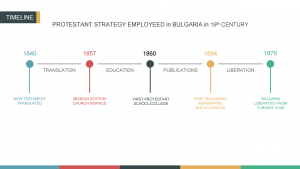 Historical and Doctrinal Formation of Holiness Teachings and Praxis among Bulgarian Pentecostals as prepared for Society Pentecostal Studies (Seattle, 2013 – Lakeland, 2015)
Historical and Doctrinal Formation of Holiness Teachings and Praxis among Bulgarian Pentecostals as prepared for Society Pentecostal Studies (Seattle, 2013 – Lakeland, 2015)
by Dony K. Donev, D.Min.
The early Bulgarian protestants were mainly Methodists and Congregational. They followed the strategy of the American and British missionaries, which began with a translation of the Bible in 1840s, followed by the first mission stations and protestant services in the 1850s.
In the following decade, Protestant schools were established in over dozen of Bulgarian cities. A broad stream of educational publications were translated and provided to schools, churches and the open public. The final goal of the missionary strategy was the establishing of churches, which began in the 1870s and continued onward.
The main sorceress of influence were the American Board of Commissioners for Foreign Missions (setup in Boston) with its local centers in Turkey and then Bulgaria; as well as from the British and Foreign Bible Society which also had centers in Constantinople and its main Slavic arm through the Russian Bible Society based in St. Petersburg.
Additionally, Baptists entered Bulgaria with their own mission work in 1875 and the Adventists in 1891. Although there were no Presbyterians churches in Bulgaria at that time, many of the agents sent by American Board of Commissioners for Foreign Missions were in fact Presbyterian and were educated at Princeton and Drew along with many Bulgarian protestants who studied abroad.
With all these key players present, Bulgaria was eventually introduced to the rise of Higher Criticism (1880–93) and consecutively to the movement to revise the Westminster Confession of Faith (1900–1910). It was met with a great resistance among Bulgarian churches. In this context, the search for holiness among Bulgarian evangelicals began at turn of the 20th country not only as an alternative to the liberal theological thought and praxis, but as a move toward a renewed spiritual identity, which ultimately became the channel for introducing Pentecostal-Holiness teachings.

Comments